The 11 dirtiest surfaces you touch every day
We touch hundreds of things each day, but these are the dirtiest of them all.
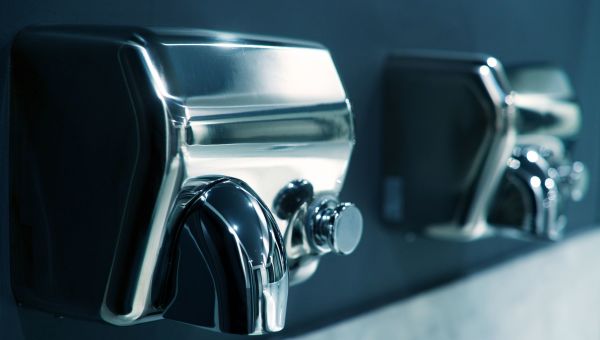
From cell phones to kitchen sponges, we touch hundreds of things each day—and most of them are home bases for germs. Eighty percent of infections like the flu, Escherichia coli (E. coli) and Staphylococcus, are spread by our hands and the things we touch. “The good news is, you’ve got millions of years of evolution of an immune system that tends to protect you from most of these things,” says infectious disease expert Raymond Blum, MD, of Presbyterian/St. Luke’s Hospital in Denver, Colorado.
But bugs like E. coli, Staphylococcus and rotavirus are constantly evolving, and spreading through these everyday items. Here are 11 of the dirtiest surfaces you touch every day, and how to protect yourself from yucky germs.
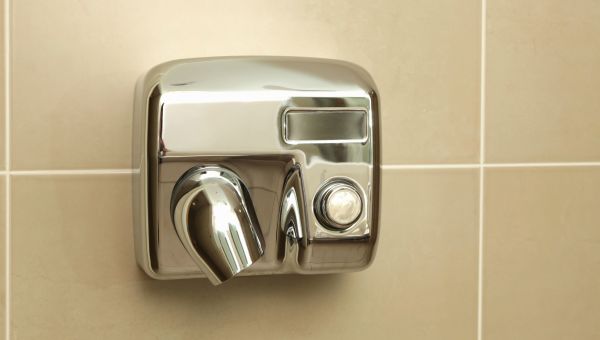
Bathroom hand dryers
The hot air hand dryers found in many public restrooms are renowned for being environmentally friendly and limiting post-potty paper towel use, but recent research reveals some potential drawbacks. A February 2018 study published in the journal of Applied and Environmental Microbiology suggests dryers carry and spread bacteria.
Researchers tested the air in 36 bathrooms for two minutes each, without dryers running, and found fewer than one bacteria colony per restroom, on average. When hand dryers in the same bathrooms were tested using a Petri dish and a 30-second timer, between 18 and 60 colonies were identified on each dish.
How does bacteria find its way into the dryer? As air rushes out of the appliance and into the bathroom, there's more air—and bacteria—being sucked in.
Avoid the germs: More research is needed to determine how this spread of bacteria may hurt your health. High-efficiency particulate air filters can often be attached to existing hand dryers, which can prevent the spread of about 75 percent of bacteria, according to the latest research. In the meantime, try using paper towels when available and avoid touching bathroom surfaces.

Cell phones
If you touch your face or mouth after handling your phone, you could increase your chances for infections like the cold, the flu and cellulitis. One study found young adults check their phones about 85 times a day; a separate study discovered one in six phones are home to fecal matter and E. coli, which can cause diarrhea, nausea or a fever. Most phones are placed in warm pockets, too—great places for bacteria to grow, says Dr. Blum.
Avoid the germs: Avoid taking your phone with you to the bathroom, and clean it with alcohol-based disinfectants every week to avoid getting sick.
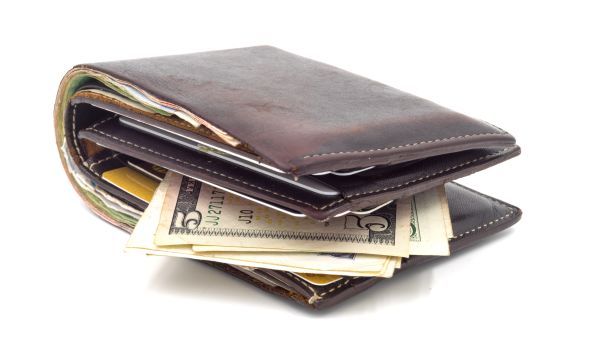
Cash
Here’s a not-so-fun fact: a single dollar bill can be home to around 3,000 different kinds of bacteria, including usual suspects like E. coli and Staphylococcus, as well as bacteria that cause acne. “The smaller the denomination of money, the dirtier it is because it’s passed around more, and people are touching it a lot,” says Blum. "Your hundred dollar bills, for example, aren’t going to be as dirty as the one dollar bills."
Avoid the germs: Money can’t be cleaned, but you can trade it in at the bank for new, presumably cleaner bills. Use hand sanitizer and wash your hands after handling money, too.
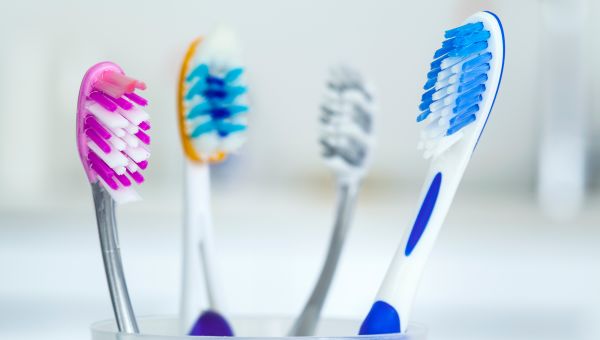
Toothbrush and toothbrush holder
Your toothbrush holder is the third-dirtiest surface in your home because it holds moisture and is rarely cleaned. It can host Salmonella, E. coli, yeast and mold. The horror doesn't end there, either: since it takes a while to dry, your toothbrush is also an incubator for mold and fungus.
Avoid the germs: You should replace your toothbrush every three to four months. It’s also best to hand wash your toothbrush holder with hot soap and water every week to minimize your chances of getting sick.
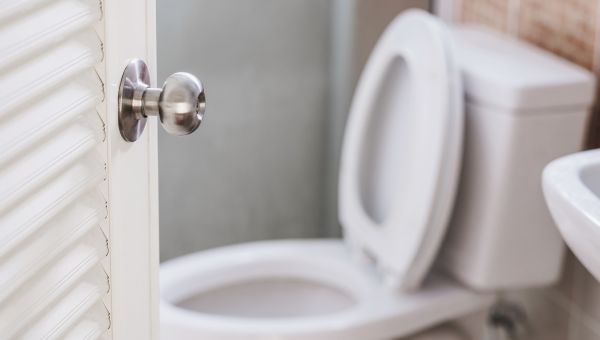
The bathroom
Your toilet seat has around 295 different types of bacteria per square inch, including E. coli and salmonella—but bathroom germs lurk in other places, too. Since bacteria thrive in moisture and humidity, they can live around your faucet, the bathtub and even the shower curtain—all of which are breeding grounds for mold, as well.
Avoid the germs: “The good news is that after they go to the bathroom, most people who touch these surfaces wash their hands,” says Blum. To help eliminate restroom bacteria, clean your toilet and sink regularly with disinfectant that includes quaternary ammonium compounds and bleach. Be sure to clean any time you’re sick to prevent the spread of more germs.
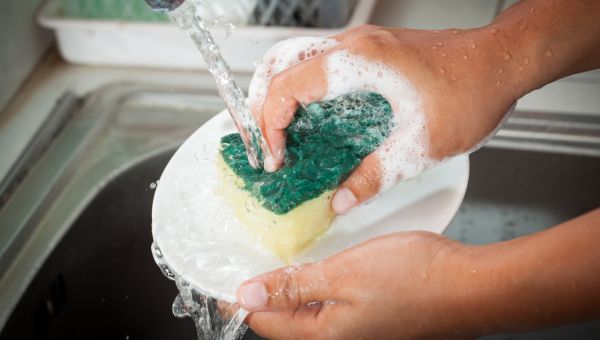
Kitchen sponges
That sponge you use to scrub dishes? Is actually soaking up all of your leftovers. “The kitchen sponge has the potential to carry food-borne bugs like Campylobacter, E. coli and salmonella, which come from raw chicken and beef,” says Blum. These bugs can cause nausea, diarrhea, chills and fever. According to a 2017 study, just a single cubic centimeter can be home to 50,000,000,000 different bacteria—which is approximately seven times the number of people on earth. Yuck! Since sponges retain water, they can be homes to yeast and mold, as well.
Avoid the germs: Replace your kitchen sponge every few weeks, especially when it smells moldy or like food. You can also disinfect your sponge, killing 99 percent of present bacteria, by soaking it in water and microwaving it for one to two minutes. If you have a metallic scrubbing tool, place it in the dishwasher, since it could catch fire if placed in the microwave.

Grocery cart
Did you know that when you put your hands on a grocery cart, you may be touching E. coli, saliva and fecal matter? That's not all; if you let your child ride in it, she could come in contact with the juices of raw meats. The common cold and the flu are spread via shopping cart, as well.
Avoid the germs: Many grocery stores provide disinfectant wipes to wipe down your cart, but it may be a good idea to bring some with you. If you don’t have wipes, wrap plastic bags around the handle.

Your handbag
The handle of your favorite purse could have more bacteria than a toilet seat, according to one study. And if you regularly place your handbag on a dirty counter or bathroom floor, you could be in for even more germs, like salmonella, E. coli, fungi and strep.
Avoid the Germs: “Alcohol wipes are very good for people to carry around in your purse or car,” says Blum. If your bag has specific material such as leather or suede, consider following the cleaning instructions provided by the bag company for best results.
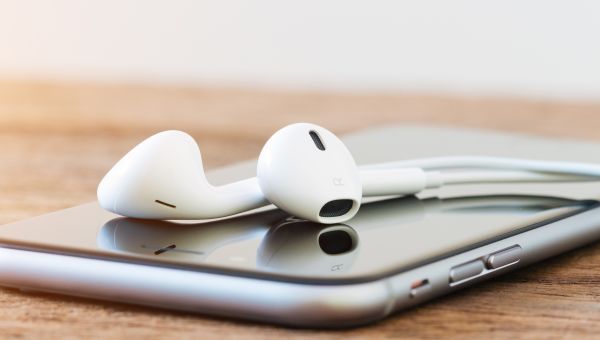
Headphones
Listening to music can lower anxiety and improve your mood, but not when it gives you an infection. Sharing headphones can introduce new bacteria into your ears—especially if ear buds scuff up your ear canal.
Avoid the germs: Always use your own pair of headphones, and wash them regularly with a lightly soapy cloth; use Q-tips to avoid damaging the speakers. Don’t forget to wipe the cord of the headphones with a disinfectant, too.

Kitchen counter
A kitchen counter is essential for food prep, but without the right care, it can be contaminated with bacteria. Common countertop bacteria include salmonella, the flu, norovirus and hepatitis A. And if you're cleaning your counter with a dirty sponge, you could be spreading even more bacteria.
Avoid the germs: Keep everyone safe by disinfecting your counter after cooking or serving food. Consider cleaning your counters with hot soap and water—or disinfectant wipes—then following with a bleach solution to knock out germs for good.

Food
Eating five to nine servings a day of fruits and vegetables is vital to a healthy diet. But if you don’t wash your food, it could introduce bacteria. “Your vegetables may be picked by someone in a field who doesn’t have access to a bathroom,” says Blum. “If you think of that each time you buy produce, you’ll want to start washing your lettuce and any other stuff that gets picked.” Common bacteria lingering on produce include E. coli, listeria, Campylobacter, norovirus, salmonella and Clostridium perfringens—a common cause of food poisoning.
Avoid the germs: Always wash your produce before preparing it. If you're making meat or fish, cook it thoroughly to kill bacteria. “It's important to wash your hands after you prepare it, too, to avoid coming in contact with that bacteria,” says Blum.
More On


video

article

slideshow


video


video
